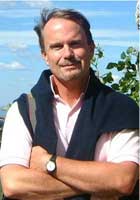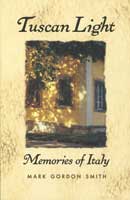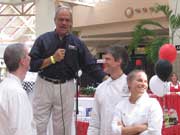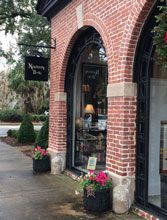Corporate executive ditches his suit and moves to Italy to become a writer? For Mark Gordon Smith, it’s not just a fairy tale… 
Corporate businessman-turned-travel writer, Mark Gordon Smith, will swing through Beaufort on Saturday, December 20th to sign copies of the first two books in his Italian Trilogy, Tuscan Echoes & Tuscan Light. These beautiful little volumes would make excellent stocking stuffers for the travel buff in your life… or anyone who longs to experience Italy, even if only through language. Smith will be at Bay Street Trading Co. in downtown Beaufort from 1-3 pm. For more information, call 24-2000.
What made you leave the corporate world to write a book? How did Italy influence your decision?
I left the corporate world after two companies I worked for went bankrupt. The experience led me to believe that the time had come to pursue a dream that I have had all of my adult life—to write. The timing seemed appropriate as well. A move was in the works and that move would take me to a new city with no corporate connections, somewhere I could have a place to reflect and create.
Italy’s influence on my decision goes back many years. My mother was a writer, never published, and I discovered a file of her work that inspired me to create a book that she never had the opportunity to write. She died of complications from cancer when I was 19, hence the dedication in the book. For all the hope that I hold for other readers to enjoy this work, the most rewarding part has been completing this dream of my mother’s.
How did your journey affect your writing?
As I began to write, every day, in and around Florence, the book began to take shape. The day to day, quiet, out-of-the-way experience of seeing a city as a semi-resident, a “semi-Fiorentino” as the Italian’s say, gave me permission to enjoy sights, sounds, and events few tourists have the time to experience. A lot of my experiences in travel to Italy over the last four decades influenced the work as well. However the key influence on my writing was the time that the season in Italy gave to me.
When did you first see Italy? What made you want to return?
Our family lived in Italy when I was six to eight years old. My earliest memories of Italy are of Florence and the Italian people. That greatly influenced me. My desire to return was motivated by both a fundamental and abiding love of Italy and Italians, as well as a reality of international travel – no one knows where you are! The ability to escape the phone, computer, email, fax, travel, cell phone routine always disappears when I’m there, and that is a great motivator as well. Silence gives me permission to create.
What were the some of the cultural differences you noticed? What was the most unexpected difference?
Cultural differences are more related to the family-centric way of Italian life. They are, as a culture, very dedicated to the family and that focus seems to dictate their way of living. Rather than allowing work to dictate how life is lived, they live their lives for the family. That was the biggest cultural difference.
The most unexpected difference was the strength of the church in Italian life. You see photographs of the Vatican, the major churches throughout Italy and, until this trip, they were places to visit, not places on which much of the culture is centered. The Italians, as a people, are very dedicated to the church. It seems, perhaps, naïve, not to have understood that before going there to live; it was the most surprising cultural difference I experienced.
You describe these memoirs as a “spiritual journey” as well as a physical one. How so? What did you learn?
I discovered a new perspective on seeing a place, and being in a place. There was a strong overtone to my experiences in that many places I visited were spiritual—churches, cemeteries, and religious festivals. The realization that the experiences of the trip were having a profound affect on me did not occur until about half way through the season. I began to feel more comfortable in silence, more aware of sounds and tastes and flavors; more so than any other time in my life. The journey became richer, more profound, because of that awareness. I believe that the greatest lesson of the season was that it is important to be “in a place,” more fully engaged in seeing and experiencing a time and a place completely.
Italy is a land of artists, and your writing has been described as “painterly”-very visual and descriptive. Describe how being in the land of the artistic masters affected your literary style.
Thank you. I do love to create a sense of place and time for readers. It is so important to this book and to the experience of reading about Italy. I believe that great art and architecture inspire creative energy. Seeing the great masters’ works throughout Italy inspired the possibility of creation-that in their legacy, they provided inspiration for those of us who have lived since they completed their works. I began to look at writing as if it were brushstrokes on a canvas.
Each word took on the significance of a brushstroke as I worked to create a clear picture of a place: the air, the smells, the view, and the sky. I remember leaving any number of museums and churches and immediately finding a place to sit and write. There was, and is, great inspiration there.
You are one of a long-standing line of writers who traveled to Italy seeking inspiration. Did you have any literary models when you went? Any literary companions on your journey?
Yes, several, actually. Christopher Hibbert’s classic The House of Medici: Its rise and Fall. I read from that constantly throughout the summer. Augustus Hare in Italy provided inspiration as did Francis King’s Florence: A Literary Companion. I re-read E.M Forster’s A Room with a View, an incredible experience to read that in Florence. David Leavitt and Mark Mitchell wrote a wonderful work Italian Pleasures, which I read off and on during the summer. I re-read Frances Mayes’ Under the Tuscan Sun, a magical work, and I read Thomas Mann’s Death in Venice. Finally, I read and re-read R.W. B. Lewis’ The City of Florence: Historical Vistas and Personal Sightings. It is an incredible resource for the lesser-known historical facts and corners of the city.
What do you think readers will take away from your book?
I hope that they will take away a curiosity about seeing Italy again, if they have been there before, or, if not, I hope that they will want to visit. I also hope that readers will find that the experiences I share are close to those that they have also had, regardless of the country. As Holly Payne writes in her wonderful book, The Virgin’s Knot, there are lands that we know simply by being in them; she calls them ’the karmic debt land(s).’ They are places in which we feel more at home than any other, and that is what Italy is for me, my soul’s home. I hope that readers will rediscover that sense of place in my writing.






